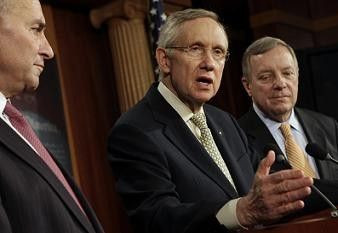As Gridlock Grips Capitol Hill, Government Shutdown Nears
ANALYSIS

Most Americans have seen this movie before: With less than six days until a possible U.S. Government shutdown, considerable differences remain between Democrats and Republicans on the content of a resolution that would keep the federal government open past Sept. 30.
In a nutshell, Senate Democrats want a larger Hurricane Irene / tornado / disaster relief bill and no offsetting spending cuts, whereas House Republicans want a smaller disaster relief bill with its spending offset by cuts to programs important to the Democratic Party -- including job-creating programs.
Third Time in Five Months U.S. Government Shutdown Looms
This is the third time in five months that the U.S. Government has been pushed to the brink of a shutdown, and if voters are beginning to conclude that gridlock is the norm in Washington, one can't blame them.
Democrats argue that linking spending cuts to disaster aid is unprecedented at best and cruel at worst.
Republicans counter that federal spending is too high, and with a $14 trillion national debt, all areas and funding situations have to be considered eligible for cuts.
From a public approval standpoint, the seemingly continual bickering and partisanship has taken a toll -- Congress' approval rating is already very low, and this latest stalemate most likely will not improve the mood of voters.
Republicans argue that they have the stronger argument in the current dispute, saying voters will deem it unacceptable that Democrats won't agree to a modest $1.6 billion in spending cuts.
Democrats argue that they have the stronger argument, saying the willingness of the Tea-Party-faction-dominated Republican Party to hold victims of Hurricane Irene, the massive floods in the Northeast, and the tornadoes in the Midwest hostage so that the Republican Party can achieve a purely partisan goal will come back to haunt the GOP in the November 2012 election.
Gov. Christie: Flood Assistance Should Be Beyond Politics
What's more, if the sentiment of some select state governors is any indicator, the parties need to reach an agreement soon, lest voter displeasure intensify and broaden to a stance of a plague on both your houses.
Governors of four Northeast U.S. states, including Gov. Chris Christy, R-New Jersey, issued a statement that federal assistance for the victims of storms and floods should be beyond politics.
On Friday, the Democratic-led Senate, as expected, made short work of rejecting a House GOP-authored, stopgap funding bill, 59 to 36, thus increasing the likelihood of a U.S. Government shutdown.
Further, as of last Friday afternoon in Washington, it was unclear what the roadmap to stalemate resolution would look like. The current resolution to keep the U.S. Government open expires Sept. 30, one day before the federal government's new fiscal year begins on Oct. 1. Without an agreement by the end of Thursday, Sept. 30, the federal government will run out of money.
The House has left town for a week's recess. While the Senate is expected to take up the stopgap funding issue again on Monday, Senate Majority Leader Harry Reid, D-Nev, said movement has occurred on the House GOP side.
Reid said he would not capitulate to the job-destroying bill from the House. However, he added that Senate Democrats would likely revise their bill to a lower aid total than the $6.9 billion originally sought, but still oppose any offsetting spending cuts that the House Republican bill contains, The New York Times reported Sunday. When asked if Senate Democrats would accept a different spending cut as an offset, Reid said, No.
House Passes Legislation That Can't Pass the Senate
White House Spokesman Jay Carney said the House GOP bill was not exactly the most efficient use of taxpayer time on Capitol Hill.
The House Republicans once again passed something that they know can't pass the Senate and therefore can't become law, which is a perfect indication the fever hasn't broken, Carney said, The New York Times reported Friday.
The GOP bill would have provided $3.7 billion for disaster relief, much less than the $6.9 billion Democratic Senate version. The GOP bill also called for cuts in solar programs -- items that are non-starters in the Democratic-controlled Senate.
Political/Public Policy Analysis: This is third time this year that the Republican and Democratic parties have clashed over a budget bill that's crucial for the continuance of U.S. Government operations.
Further, the pattern of the conservative Tea Party-led Republican Party is obvious: use brinkmanship on every piece of legislation for funding that the party opposes, threaten the nation with a U.S. Government shutdown, then try to extract compromises to achieve the party's short-term, partisan interests.
In other words, it appears the Tea Party-led GOP has permanently put the interests of its political base ahead of the national interest and the societal interest -- even if doing so harms the nation. (The Tea Party faction nearly triggered a U.S. Government default in the summer, in the granddaddy of all brinkmanship moves.) The Tea Party's tactic is irresponsible, reckless, and counter-productive, and it is harming the nation -- and definitely not what American voters wanted when they returned the GOP to power in the House in the 2010 election: voters elected the GOP to create jobs.
Senate Democrats were hoping that House Republicans would move closer to the center in the latest vote; instead they moved closer to former President Herbert Hoover.
Hence, the risk barometer, on a scale of 0 to 100 percent, of the likelihood of a U.S. Government shutdown, has risen to 40 percent on Sunday at midday, 5 percentage points higher than Friday night.
© Copyright IBTimes 2024. All rights reserved.





















